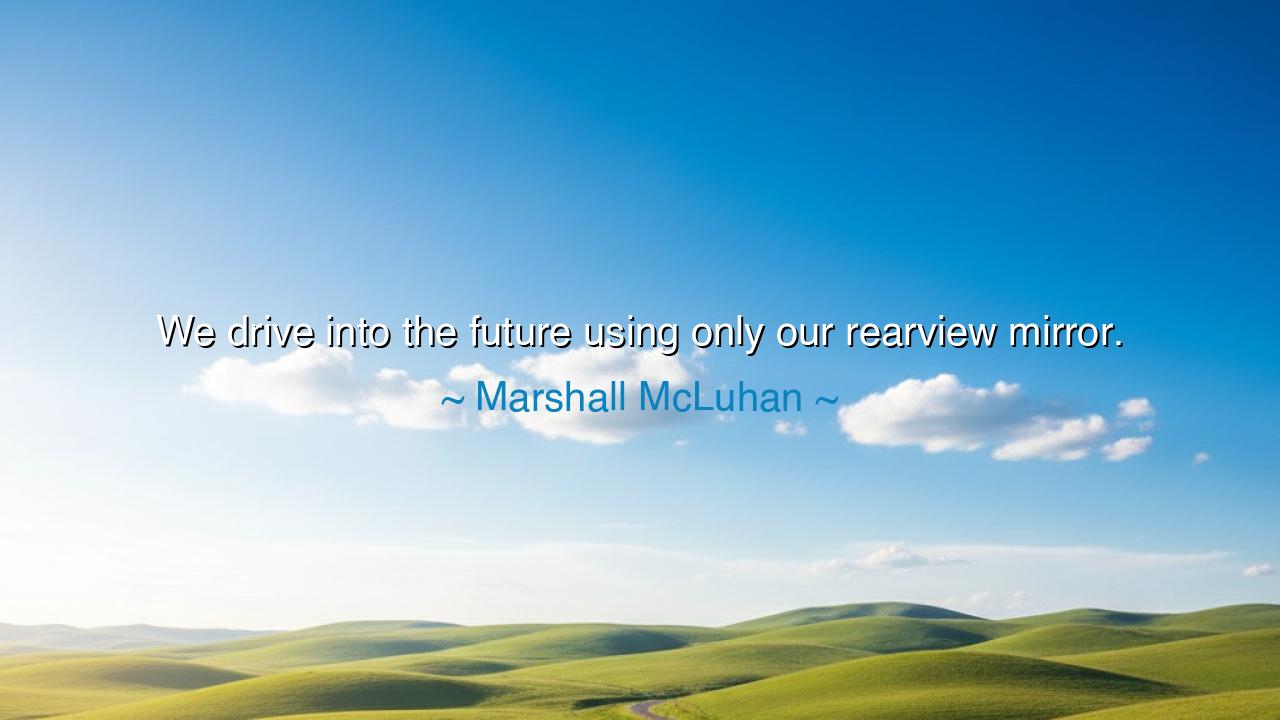
We drive into the future using only our rearview mirror.






When Marshall McLuhan said, “We drive into the future using only our rearview mirror,” he spoke of a profound truth about the nature of human perception and our relationship to time. His words suggest that we, as a species, are often bound by the past, not only in our memories but in the way we shape our path forward. Like a driver looking back through the rearview mirror, we are constantly influenced by what has come before, even as we move toward the unknown future. McLuhan, a philosopher and media theorist, understood that the past—with its experiences, lessons, and histories—shapes how we approach the present and project into the future. The lesson in his words is not just a reflection on technology or media but on the way humanity moves through life, continually shaped by the past.
The ancients also understood the weight of the past on the present. Herodotus, the great historian, spent much of his life recording the stories and events of the past, knowing that these histories would not only inform the present but guide the future. He understood that civilizations are built on the foundation of what has come before, and that by studying the lessons of the past, we gain the wisdom to navigate the uncertainties of the future. Yet even Herodotus would have known that to focus solely on the rearview mirror—on history—would be to neglect the ever-present opportunity to create the future. McLuhan’s words resonate with the idea that, while we may look back for wisdom, we must also be aware that the world is in constant flux, and the future requires us to embrace change and move forward.
This notion is echoed in the life of Alexander the Great, who conquered vast swaths of the known world. He, too, was influenced by the legacy of the past—studying the strategies of previous empires, learning from the generals who came before him. But unlike many of his contemporaries, Alexander did not let the glories of the past confine him. He took the lessons of history and charted his own course, creating a legacy of his own. If Alexander had spent too much time gazing into the rearview mirror of history, he would have been content with merely repeating what had already been done. Instead, he looked forward, drawing strength from the past but always with his eyes fixed on the new horizons that lay ahead.
McLuhan’s quote also speaks to the nature of human progress. Leonardo da Vinci, the Renaissance genius, was equally captivated by the past. He studied the works of the ancient Greeks, the Romans, and the scientists who came before him. Yet, he did not simply look back in reverence. He used his knowledge of the past to innovate and create new ideas that would shape the future. His inventions, though rooted in the understanding of ancient mechanics, were the seeds of future technologies. Like McLuhan, da Vinci understood that while the rearview mirror of history is a tool for reflection, it is the forward gaze that drives innovation. True progress lies in using the wisdom of the past to build something new.
In this sense, McLuhan’s quote is a warning as much as it is a reflection. We must acknowledge the lessons of the past, but we must also free ourselves from its constraints. The rearview mirror, while useful, is a limited tool; it offers a view of what is behind us, not what lies ahead. If we spend too much time looking at our past—at the mistakes, the triumphs, the glories, and the failures—we risk missing the opportunities and possibilities of the present and the future. To truly drive forward in life, we must balance our reflection on the past with a forward momentum, embracing the unknown and trusting in our ability to navigate it.
In practical terms, McLuhan’s insight encourages us to ask ourselves: How often do we find ourselves stuck in the past—whether in regret, nostalgia, or fear of what we have already lived? How often do we live in the shadow of our former selves, unable to fully embrace the future because we are held back by the weight of what has already happened? The key lesson here is that we must look to the past not as a crutch, but as a foundation upon which we can build. Our history informs us, but it should not define us. To move forward, we must develop the courage to trust in the uncertainty of the future and the possibilities it holds.
Thus, let McLuhan’s words inspire us to move forward with purpose. The rearview mirror is helpful, but it is not enough to guide us. We must learn to balance reflection with action, memory with innovation, and past with future. Every new day presents an opportunity to shape the course of our lives. When we look forward with confidence, using the wisdom of the past but not letting it restrict us, we are able to drive into the future, not as mere passengers, but as active creators of the road ahead.






AAdministratorAdministrator
Welcome, honored guests. Please leave a comment, we will respond soon